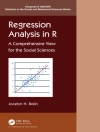‘The organization of the reader′s guide—especially the groupings of landmark cases, race riots, and criminology theories—is impressive … Other related titles lack the breadth, detail, and accessibility of this work … Recommended for all libraries; essential for comprehensive social studies collections.’
—Library Journal
As seen almost daily on local and national news, race historically and presently figures prominently in crime and justice reporting within the United States, in the areas of hate crimes, racial profiling, sentencing disparities, wrongful convictions, felon disenfranchisement, political prisoners, juveniles and the death penalty, and culturally specific delinquency prevention programs.
The Encyclopedia of Race and Crime covers issues in both historical and contemporary context, with information on race and ethnicity and their impact on crime and the administration of justice. These two volumes offer a greater appreciation for the similar historical experiences of varied racial and ethnic groups and illustrate how race and ethnicity has mattered and continues to matter in the administration of American criminal justice.
Key Features
- Covers a number of broad thematic areas: basic concepts and theories of criminal justice; the police, courts, and corrections; juvenile justice; public policy; the media; organizations; specific groups and populations; and specific cases and biographies
- Addresses such topics as gender, hate/bias crimes, immigrant experiences, international and cross-cultural issues, race and gangs, and race and law,
- Presents experiences of all major racial and ethnic groups in the U.S., including Asians, Blacks, Latinos, Native Americans, and Ethnic Whites, as well as religious minorities, such as Muslims
- Includes coverage of recent incidents like the alleged rape of a black female North Carolina Central University student by white male members of the Duke University Lacrosse Team;, the Jena 6 incident; the Tulia, Texas drug arrests; the Rodney King beating; the O. J. Simpson trials in the 1990s; and more recent racial profiling incidents
- Two appendices provide information on locating and interpreting statistical data on race and crime, as well as detailed instructions on how to access statistical data on the web for such specific areas as arrests, drugs, gang membership, hate crimes, homicide trends, juvenile justice, prison populations, racial profiling, the death penalty, and victimization
Because the topic of race and crime is of wide interest and relevance, entries in this Encyclopedia are written in an accessible style to appeal to a broad audience, making it a welcome addition to academic and public libraries alike.
A propos de l’auteur
Shaun L. Gabbidon is Distinguished Professor of Criminal Justice in the School of Public Affairs at Penn State Harrisburg. He earned his Ph D in Criminology at Indiana University of Pennsylvania. Dr. Gabbidon has served as a fellow at Harvard University’s W. E. B. Du Bois Institute for Afro-American Research and as an adjunct faculty member in the Center for Africana Studies at the University of Pennsylvania. His areas of interest include race and crime, criminal justice and criminology pedagogy, and private security. Professor Gabbidon is the author of more than 100 scholarly publications, including 60 peer-reviewed articles and 11 books.












